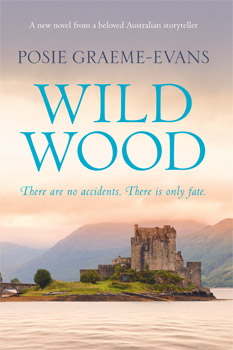Wild Wood

Wild Wood
Jesse Marley calls herself a realist; she's all about the here and now. But in the month before Charles and Diana's wedding in 1981 all her certainties are blown aside by events she cannot control.
First she finds out she's adopted. Then she's run down by a motor bike. In a London hospital, unable to speak, she must use her left hand to write. But Jesse's right-handed. And as if her fingers have a will of their own, she begins to draw places she's never been, people from another time"a castle, a man in armour and a woman's face.
Rory Brandon, Jesse's neurologist, is intrigued. Maybe his patient's head trauma has brought out latent abilities. But there's something else. He knows the castle. He's been there.
Rory takes Jesse to Hundredfield. Built by a brutal Norman warlord a thousand years ago to subdue the Scottish Borderlands, the castle has been passed down within the noble Dieudonné family. In the fourteenth century his descendants are the guardians of this savage country, trapped by duty to keep the peace between England and Scotland.
Posie Graeme-Evans, Australia's most beloved storyteller, returns with a sweeping time-slip tale that will enchant readers who enjoy great stories.
Posie Graeme-Evans is the internationally bestselling author of five novels, including The Dressmaker and The Island House. She has worked in Australian film and television for the last thirty years as a director, commissioning executive, and creator/producer of hundreds of hours of drama and children's series, including the worldwide smash-hit McLeod's Daughters and Daytime Emmy–nominated Hi-5. She lives in Tasmania with her husband and creative partner, Andrew Blaxland.
Wild Wood
Simon and Schuster
Author: Posie Graeme-Evans
ISBN: 9781925030341
RRP: $29.99
Interview with Posie Graeme-Evans
Question: What inspired you to write Wild Wood?
Posie Graeme-Evans: Some people I know (and I have their names : ) consider that I'm obsessed with Scotland and Scottish history. Sadly, they're right.
That (so nearly independent, so many times) country has been fought over by so many people that whoever it was who said, drama is conflict must have been talking about Scotland. The stories don't seep out of the ground or the buildings there, they gush!
And, that was why I wrote 'Wild Wood". The place just sucked me in. I spent some time in the Western Isles and also in the Borderlands between England and Scotland in the snowy march of 2013; driving down unknown roads, crossing moors and rivers and the story built itself from the tragic, extraordinary, touching history of the Borderers.
Question: What research went into this title?
Posie Graeme-Evans: So far, with every book, the time comes when I have to walk the ground on which the story is set. For 'Wild Wood" that's meant two separate trips to Scotland (do you hear me complaining? : ) I take endless photographs of course, but mostly I stand and look and hear and smell and all those sensory impressions find their way into the texture of what I write.
Stories, for me, come out of the mist at the back of my head. If I pay attention, sooner or later somebody steps forward, or I hear a voice (yes, all writers are mad) and, like following a map, I walk forward trustingly – or run! – hoping to get to know that person. As the story finds its form I also research specific things – clothes, food, transport, sewerage treatment (I could bore for Australia on medieval waste disposal!) and those nuggets, those factoids, can give me the background for entire chapters. I adore research!
Question: How much of your inspiration comes from real life and real people?
Posie Graeme-Evans: A great deal. However though I'll see, or read about, intriguing places and people and specific events, I find the stories I write have a mind of their own.
For the last three books, 'The Dressmaker", 'The Island House" and now, 'Wild Wood", the historical settings have all been based in a patchwork of actual places and built from the fragments of the lives of real people; the protagonists, however, are fictional. I think there's more freedom that way. But that was not the case with my first three novels. 'The Innocent", 'The Exiled" and 'The Beloved" were all set in the era of the Wars of the Roses. For them, real people such as Edward IV and members of his family and court walked in and out of the life of my fictional heroine, Anne de Bohun. I loved Anne. If she had been real I have every faith she would have changed history : )
Mostly, though, it's the landscape of history that I find inspiring. We're them, they're us – we all have the same drives and desires and needs – it's just that we wear different things and eat odd food (though their food was pretty strange at times.)
Question: What was the best thing about creating the character of Jesse Marley?
Posie Graeme-Evans: I really like that she's an ordinary Australian girl tossed into a fruit salad of legend, lies and fate. Years ago I heard the story of the MacLeod fairy flag. It's displayed at Dunvegan castle on the Isle of Skye, and it's the symbol of the marriage of the Laird to a fairy woman a thousand years ago. That legend was the spark for Jesse's story and the challenge of blending mystical and mythical events – told straight – and a real life (or as real as I could make her) was endlessly stimulating. The thing about Jesse is she doesn't know who she is, or where she belongs, but she's determined to change both those things. And thereby hangs the tale…
Question: What's next, for you?
Posie Graeme-Evans: Perhaps it's bizarre but I'm developing a new TV series set in New Zealand. And writing another book, 'The Outer Sea". I'm enjoying them both : )
Interview by Brooke Hunter
MORE



